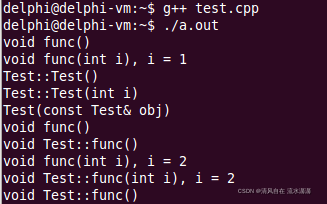C++函数重载
清风自在 流水潺潺 人气:0一、函数重载回顾
- 函数重载的本质为相互独立的不同函数
- C++ 中通过函数名和函数参数确定函数调用
- 无法直接通过函数名得到重载函数的入口地址
- 函数重载必然发生在同一个作用域中
二、类中的重载
类中的成员函数可以进行重载
- 构造函数的重载
- 普通成员函数的重载
- 静态成员函数的重载
问题:全局函数,普通成员函数以及静态成员函数之间是否可以构成重载?
注意事项
- 重载函数的本质为多个不同的函数
- 函数名和参数列表是唯一的标识
- 函数重载必须发生在同一个作用域中
所以类的成员函数和全局函数不能构成重载,因为全局函数位于全局的命名空间当中,而成员函数位于类里面,作用域不一样。
下面看一个重载的示例:
#include <stdio.h>
class Test
{
int i;
public:
Test()
{
printf("Test::Test()\n");
this->i = 0;
}
Test(int i)
{
printf("Test::Test(int i)\n");
this->i = i;
}
Test(const Test& obj)
{
printf("Test(const Test& obj)\n");
this->i = obj.i;
}
static void func()
{
printf("void Test::func()\n");
}
void func(int i)
{
printf("void Test::func(int i), i = %d\n", i);
}
int getI()
{
return i;
}
};
void func()
{
printf("void func()\n");
}
void func(int i)
{
printf("void func(int i), i = %d\n", i);
}
int main()
{
func();
func(1);
Test t; // 初始化,调用没有参数的构造函数Test(),输出Test::Test()
Test t1(1); // Test::Test(int i)
Test t2(t1); // Test(const Test& obj)
func(); // void func()
Test::func(); // void Test::func()
func(2); // void func(int i), i = 2;
t1.func(2); // void Test::func(int i), i = 2
t1.func(); // void Test::func()
return 0;
}输出结果如下:

这个例子展示了类中函数的重载以及全局函数的重载,值得多阅读几遍!!
三、重载的意义
- 通过函数名对函数功能进行提示
- 通过参数列表对函数用法进行提示
- 扩展系统中已经存在的函数功能
下面看一个字符串拷贝函数的重载:
#include <stdio.h>
#include <string.h>
char* strcpy(char* buf, const char* str, unsigned int n)
{
return strncpy(buf, str, n);
}
int main()
{
const char* s = "AutumnZe";
char buf[8] = {0};
//strcpy(buf, s);
strcpy(buf, s, sizeof(buf)-1);
printf("%s\n", buf);
return 0;
}输出结果如下:

四、小结
- 类的成员函数之间可以进行重载
- 重载必须发生在同一个作用域中
- 全局函数和成员函数不能构成重载关系
- 重载的意义在于扩展已经存在的功能
加载全部内容